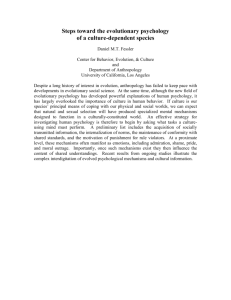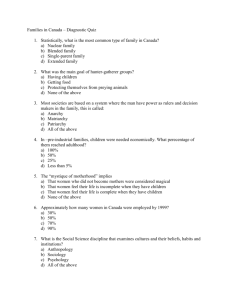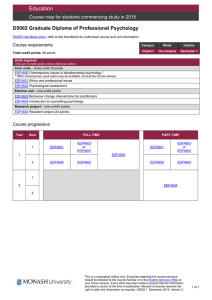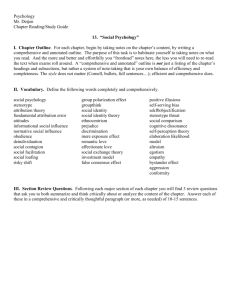Social Sciences Learning Outcomes
advertisement
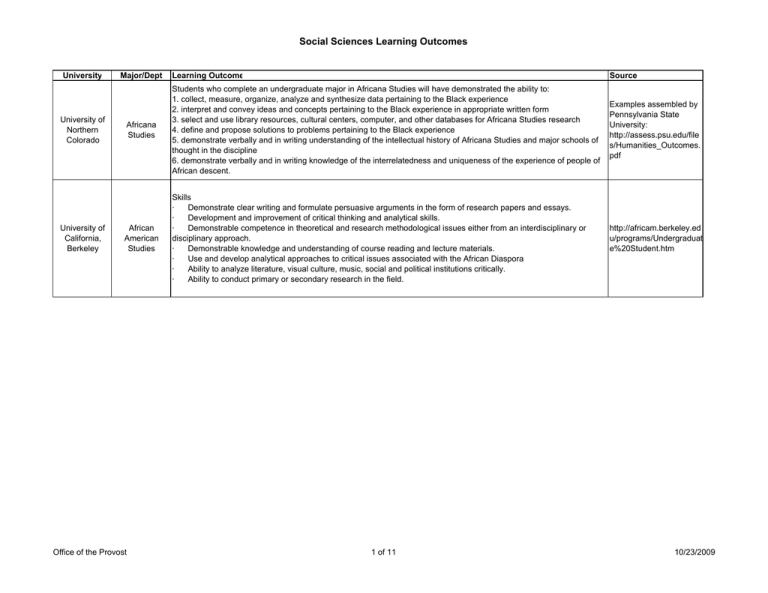
Social Sciences Learning Outcomes University University of Northern Colorado University of California, Berkeley Major/Dept Learning Outcome Source Africana Studies Students who complete an undergraduate major in Africana Studies will have demonstrated the ability to: 1. collect, measure, organize, analyze and synthesize data pertaining to the Black experience 2. interpret and convey ideas and concepts pertaining to the Black experience in appropriate written form 3. select and use library resources, cultural centers, computer, and other databases for Africana Studies research 4. define and propose solutions to problems pertaining to the Black experience 5. demonstrate verbally and in writing understanding of the intellectual history of Africana Studies and major schools of thought in the discipline 6. demonstrate verbally and in writing knowledge of the interrelatedness and uniqueness of the experience of people of African descent. Examples assembled by Pennsylvania State University: http://assess.psu.edu/file s/Humanities_Outcomes. pdf African American Studies Skills · Demonstrate clear writing and formulate persuasive arguments in the form of research papers and essays. · Development and improvement of critical thinking and analytical skills. · Demonstrable competence in theoretical and research methodological issues either from an interdisciplinary or disciplinary approach. · Demonstrable knowledge and understanding of course reading and lecture materials. · Use and develop analytical approaches to critical issues associated with the African Diaspora · Ability to analyze literature, visual culture, music, social and political institutions critically. · Ability to conduct primary or secondary research in the field. http://africam.berkeley.ed u/programs/Undergraduat e%20Student.htm Office of the Provost 1 of 11 10/23/2009 Social Sciences Learning Outcomes I Research Skills: a. Students learn how to locate and evaluate primary source materials and secondary texts. These include published contemporary and historical documents, artifacts of material culture, landscape and architectural structures, visual and auditory media, oral history and folklore. University of California, Berkeley American Studies II Critical Thinking Skills: a. Students learn how to analyze and evaluate cultural texts including literature, performance, film, art, etc. and demonstrate a basic understanding of cultural theory and aesthetics (i.e. to understand and think critically about American society from a humanities perspective). b. Students learn to critically analyze and evaluate social science arguments, demonstrating an understanding of the premises of qualitative and quantitative evidence. (i.e understand and think critically about American society from a social science perspective). c. Students learn to analyze and understand the American past so as to gain perspective on and critical understanding of current issues and problems in American life. (i.e. to understand and think critically about American society from an historical perspective -which by definition integrates humanities and social science approaches). d. Students learn to critical analyze and interpret the meaning of American material culture and its built and natural environments. (i.e. understand and think critically about American society from the perspectives of the knowledges embodied in the disciplines of geography, architecture, landscape architecture, environmental studies, and art). III Written and Oral Communication Skills a. Students learn how to communicate effectively in written form, demonstrating the ability to formulate a well organized argument supported by evidence. b. Students learn how to communicate effectively orally, while demonstrating the ability to listen and respond to what others are saying. http://ls.berkeley.edu/ugis /as/ major/learning.php IV Specialized Knowledge a. Time: Students gain in depth, substantive knowledge about American life and culture in a particular year. b. Place: Students gain in depth, substantive knowledge about American life and culture in a particular city, region, or other place. c. Students gain in depth substantive knowledge about particular themes, issues, problems, and questions in American life and experience. V Integrative knowledge and skills a. Students demonstrate their mastery of all of the above skills by writing a Senior Thesis that is a focused interdisciplinary research project in their specialized area of concentration. Office of the Provost 2 of 11 10/23/2009 Social Sciences Learning Outcomes I. Learning about Anthropology 1. Understand core concepts in contemporary biological anthropology. 2. Understand core concepts in contemporary anthropological archeology. 3. Understand core concepts in contemporary sociocultural anthropology, including medical anthropology. 4. Develop understanding of the history of anthropological thought. 5. Gain experience in fieldwork and the application of theory and methodology. 6. Develop understanding of the anthropological analysis of visual media and language. University of California, Berkeley II. Critical Thinking, Communication, and Analytical Goals 7. Encourage critical abilities in the analysis of evolutionary, historical and contemporary situations. Anthropology 8. Develop the ability to analyze comprehensively and critically scholarly articles and monographs. 9. Develop facility in conveying anthropological concepts and debates to public audiences. 10. Formulate well-organized written and oral arguments supported by evidence. http://anthropology.berkel ey.e du/programs/undergradua te/u sli.php III. Learning About the World 11. Understand the structure and transformation of society and culture past and present 12. Analyze regional and cultural diversity in the organization of human societies and the impact of cultural contacts and globalization. 13. Integrate biological and cultural perspectives on human behavior, social organization, and the environment. 14. Utilize anthropological concepts and methods to understand the history and forms of diversity in U.S. society. University of Colorado at Boulder The undergraduate degree in anthropology emphasizes knowledge and awareness of: • basic methods, concepts, alternative theories and approaches, and modes of explanation appropriate to each of the three main subfields of the discipline (archaeology, biological anthropology, and cultural anthropology); • basic archaeological techniques, including stratigraphy, dating, and inference of human behavior from archaeological data, as well as human history from its beginning through the emergence of complex societies; • variation, patterning, and creativity in human communities and symbolic systems, including ecological, social structural, and cultural factors exemplified in a diverse array of the world’s societies, including http://www.colorado.edu/c those undergoing change as a result of globalization and the impact of contemporary social and political movements; and atalog/catalog09Anthropology • theories of primate and human evolution and the basic data of the hominid fossil record, as well as biological variation 10/download/catalog09in contemporary human populations. 10.pdf In addition, students completing the degree in anthropology are expected to acquire the ability and skills to: • identify trends or patterns in anthropological data from different cultures or periods, identify an appropriate context of explanation or interpretation, and formulate a testable explanation or reasonable interpretation, including the ability to identify data that constitute credible evidence for an explanation or interpretation; and • identify and define a significant problem or topic in anthropology and analyze and interpret data in a systematic manner. Office of the Provost 3 of 11 10/23/2009 Social Sciences Learning Outcomes Univeristy of California, Berkeley * Students will be skilled in critical thinking and decision making, as supported by the appropriate use of analytical and quantitative techniques. * Students will apply functional area concepts and theories appropriately. Haas School of * Students will be effective communicators who can prepare and deliver oral and written presentations using appropriate Business technologies. * Students will be sensitive to the ethical requirements of business activities. * Students will tackle strategic and organizational challenges with innovative solutions. Office of the Provost 4 of 11 http://www.haas.berkeley. edu/ Undergrad/learninggoals. html 10/23/2009 Social Sciences Learning Outcomes I. Critical Thinking Skills 1. Apply economic analysis to evaluate everyday problems. 2. Apply economic analysis to evaluate specific policy proposals. 3. Compare two or more arguments that have different conclusions to a specific issue or problem. 4. Understand the role of assumptions in arguments. II. Quantitative Reasoning Skills 1. Understand how to use empirical evidence to evaluate an economic argument. 2. Interpret statistical results. 3. Conduct appropriate statistical analysis of data, and explain the statistical problems involved. 4. Obtain and/or collect relevant data using specific qualitative and/or quantitative research methods. Univeristy of California, Berkeley Economics III. Problem-Solving Skills 1. Solve problems that have clear solutions. http://emlab.berkeley.edu/ 2. Propose solutions for problems that do not have clear answers, and indicate under what conditions they may be viable eco solutions. n/ugrad/ugrad_goals.sht ml IV. Specialized Knowledge and Application of Skills 1. In specific content areas (fields) of economics, develop deeper critical and quantitative thinking skills and apply problem-solving skills to complex problems. V. Communication Skills 1. Communicate effectively in written, spoken, and graphical form about specific economic issues. 2. Formulate a well-organized written argument that states assumptions and hypotheses, which are supported by evidence. 3. Present an economic argument orally. VI. Lifelong Learning Skills 1. Possess a working knowledge of information data bases (e.g., Econ Lit, Nexis-Lexis) 2. Know how to locate and use primary data sources (e.g., BLS Household Survey, UN Human Development Index) 3. Understand and evaluate current economic events and new economic ideas. Office of the Provost 5 of 11 10/23/2009 Social Sciences Learning Outcomes University of Colorado at Boulder Economics University of California, Berkeley Office of the Provost The undergraduate degree in economics emphasizes knowledge and awareness of: • the conditions for efficiency in free market production and exchange; • contemporary theories concerning economic growth, inflation, unemployment, distribution of income, and international environment; • specialized fields of economics, such as international economics and finance, natural resources and environment, the economics of gender and discrimination, and public economics; • the descriptive statistics commonly used by economists; and • the institutional characteristics of the U.S. economy, and how these differ from those in other economies. In addition, students completing the degree in economics are expected to acquire the ability and skills to: • apply the tools of microeconomic theory to reach sound conclusions for simple economic problems; • follow arguments concerning macroeconomic theory, to distinguish between sound and fallacious reasoning, and understand how differences in policy prescription may arise; • perform statistical analysis such as multiple regression and understand similar analyses performed by others; and • communicate economic reasoning in writing, understand similar writing by others, and appreciate the diversity of views that may reasonably exist about economic problems. 1. Knowledge. Students will learn to: A. Distinguish and characterize significant periods of historical experience in multiple societies from different parts of the globe. B. Describe events and developments in the history of multiple societies in terms of continuity, change,and causation. C. Understand interpretive debates about the past D. Appreciate the complexities involved in interpreting societies and social change: for example, the local and the global, particular and general, contingent and structural. E. Identify different kinds of historical evidence and understand their role in the production of historical knowledge. History II. Skills. Studies will be able to: A. Recall factual claims about the past and synthesize them into coherent interpretive arguments. B. Read documents closely and critically. C. Formulate a well-organized, well-supported argument. D. Demonstrate clear writing in the form of essays of varying lengths. E. Make cogent oral arguments about readings assignments in the context of a seminar discussion. F. Conduct original research with primary sources. G. Locate good, relevant secondary scholarship, and distinguish good scholarship from poor. H. Observe ethical practices of citation and intellectual self-presentation. 6 of 11 http://www.colorado.edu/c atalog/catalog0910/download/catalog0910.pdf http://history.berkeley.edu /und ergraduate/USLI.pdf 10/23/2009 Social Sciences Learning Outcomes University of Colorado at Boulder Office of the Provost History The undergraduate degree in history emphasizes knowledge and awareness of: • the main topics in the political, social, cultural, and economic history of the United States, from its origins to the present; • the main topics in the political, social, cultural, and economic history of western civilization, from its origins in antiquity to the present; • the main topics in the political, social, cultural, and economic history of one or more geographic areas outside Europe and America; and http://www.colorado.edu/c • methodology in historical studies. atalog/catalog0910/download/catalog09In addition, students completing the degree in history are expected to acquire the ability and skills to: 10.pdf • research and conduct an investigation, consulting appropriate works for developing a bibliography; • distinguish between primary and secondary sources, analyze arguments and interpretations, and recognize interpretative conflicts; • interpret evidence found in primary sources and develop an historical argument based on and sustained by the evidence available; and • produce historical essays that are coherent, cogent, and grammatically correct. 7 of 11 10/23/2009 Social Sciences Learning Outcomes University of Colorado at Boulder Political Science The undergraduate degree in political science emphasizes knowledge and understanding of: • the values and beliefs that constitute the Western political tradition, and alternative ideologies and belief systems; • the institutions and processes of the American political system and its strengths and weaknesses in the 21st century; • other political systems, both Western and non-Western, which are members of the world community, our allies and competitors in international relations, and through comparative analysis offering a source of insight into American society and politics; • the patterns of interaction among members of the world community, the causes of war and peace, and the sources of international conflict and cooperation; and • the domestic and international policy issues facing the United States and the world community, and the ability to make reasoned judgments—integrating facts and values, means and ends—regarding policies to address those problems. http://www.colorado.edu/c atalog/catalog0910/download/catalog0910.pdf In addition, students completing the degree in political science are expected to acquire the ability and skills to: •evaluate conflicting arguments, assemble and present empirical evidence, and make reasoned conclusions from the evidence available; and • communicate effectively, both orally and in written form. Purdue Psychology Office of the Provost Students who complete an undergraduate major in Psychology will 1. Show familiarity with the major concepts, theories, findings and history of psychology. 2. Understand and use psychological research methods (i.e., design, data analysis and interpretation). 3. Understand and generate applications of psychology to individual, social and organizational issues. 4. Understand and abide by the ethics of psychology, including those encouraging the recognition, understanding and respect for socio-cultural complexity and international diversity. 5. Understand themselves, acquire effective collaboration skills and develop realistic ideas about how to pursue careers in psychology and related fields. 6. Write and speak effectively, demonstrate information competence and use technology successfully. 7. Use critical and creative thinking in the scientific approach to problem solving. 8 of 11 Assembled by Pennsylvania State University: http://assess.psu.edu/ID_ ProgObj/ 10/23/2009 Social Sciences Learning Outcomes University of California, Berkeley Psychology Office of the Provost 1. Define basic concepts that characterize psychology as a field of scientific inquiry; and appreciate the various subfields that form the discipline as well as things that differentiate it from other related disciplines. Develop an understanding of the central questions, issues in contemporary psychology. 2. Be familiar with the range of methods used to investigate psychological questions. 3. Develop skills to critically evaluate the presentation of scientific ideas and research in the popular media. 4. Develop competence in reading and evaluating original scientific papers. 5. Become familiar with the basic concepts of statistics and develop skills in evaluating information from a statistical perspective. 6. Develop and articulate, both orally and in written form, a testable hypothesis, or an argument drawing from an existing body of literature. http://psychology.berkeley 7. Develop competence in interpreting graphical data to understand what is being compared/manipulated (independent .edu variables) and what is being measured (dependent variables). /undergrad/goals.html 8. Be familiar with the history of psychology as a field and different theoretical and empirical frameworks that have defined and shaped the field. 9. Apply a psychological principle to an everyday problem; or take an everyday problem and identify the relevant psychological mechanisms/issues. 10. Develop a deeper understanding of one of the major content areas of psychology (i.e., Social/personality, Developmental, Clinical, Cognitive, Biological). 11. Develop an understanding and an appreciation of how social (e.g., environmental/cultural), and biological (genes, hormones) factors jointly shape human behavior. 12. Develop an awareness of the importance of science to humanity while recognizing its limits (i.e., some scientific knowledge is culture specific and may not applicable to the human condition universally) 9 of 11 10/23/2009 Social Sciences Learning Outcomes University of Colorado at Boulder Psychology The undergraduate degree in psychology emphasizes knowledge and awareness of: • the social and biological background of human nature; • the research bases necessary for understanding and predicting behavioral outcomes; • descriptive and inferential statistics, including measures of central tendency, variance, and correlation; • psychology as a laboratory science and of the interplay between theory and research; • possible practical applications of research knowledge; • the influences of interactions between attributes of the social situation and psychological attributes of a person in generating human behavior and subjective experience; • the development and amelioration of abnormal thoughts, feelings, and behavior; • the mechanics of heredity, neural transmission, plasticity, development, and aging; • a reasonable integrated historical overview of modern psychology, including the major subdivisions of the discipline and their interrelations; • major ideas and scholars in the discipline subfields and the relationship of ideas from one area to another; and • the ethical issues germane to research investigation raised by the applications and practice of psychology as a profession. http://www.colorado.edu/c atalog/catalog0910/download/catalog0910.pdf In addition, students completing the degree in psychology are expected to acquire the ability and skills to: • evaluate critically research designs, results, and interpretations; • design and carry out research on their own; • know when to use basic statistical tests, to formulate hypotheses, collect and analyze data, draw conclusions, and clearly communicate research findings; • assess the characteristics of social situations and measure the psychological attributes of individuals; • use the primary literature of biological and developmental psychology to prepare a clear written summary of a research topic; and • place current psychological concerns into an appropriate overarching conceptual framework that encompasses the entire field. Office of the Provost 10 of 11 10/23/2009 Social Sciences Learning Outcomes University of Colorado at Boulder Sociology Office of the Provost The undergraduate degree in sociology emphasizes knowledge and awareness of: • the basic data, concepts, theories, and modes of explanation appropriate to the understanding of human societies; • the structure of modern American society, its social stratification, its ethnic, racial, religious, and gender differentiation, and its main social institutions—family, polity, economy, and religion; • the basic social processes that maintain and alter social structure, especially the processes of integration, organization, and conflict; and http://www.colorado.edu/c • the diversity of human societies, including the differences between major historical types such as foraging, agricultural, atalog/catalog09industrial, and post-industrial societies. 10/download/catalog0910.pdf In addition, students completing the degree in sociology are expected to acquire the ability to: • locate and consult works relevant to a sociological investigation and write a sociological paper that is coherent, cogent, and grammatically correct; • understand the basic procedures of sociological research and analyze sociological data; • understand and interpret the results of sociological research; and • integrate and evaluate sociological writings. 11 of 11 10/23/2009

